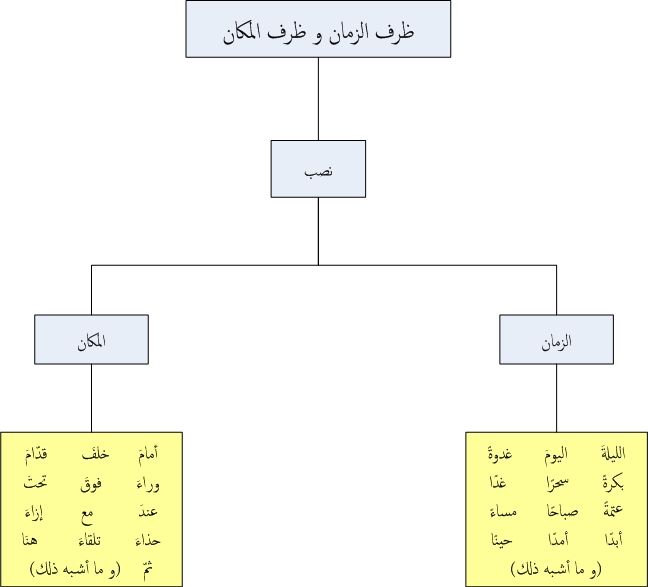How do you say in Arabic “today“, “tomorrow“, “tonight“, “sometimes“, “now“, “never“, “forever“, etc.?
If you want to be really fluent in Arabic, then there’s no question about it my friend:
You absolutely should learn عن ظهــــــــــر قـــــلــب (by heart) the following “Must-Know” Arabic adverbs of time!
Every فِعْــــــــــل (verb) must occur in a given زَمَــــــــــــــــان (time) and a given مَكَـــــــــــــــــان (place) .
Take the following question for example:
“هل زُرت بُرج الخَلِيــــــــــــــــفَةِ مُـــؤَخَّــــــــــــرًا ؟”
(“Have you visited Burj Al-Khalifa lately?”)
By saying “مُـــؤَخَّــــــــــــرًا” (“recently”) at the end of the sentence, you specify exactly the time frame during which you want to know whether someone has paid a visit to the famous Dubai building.

This diagram shows some Arabic Adverbs of Time (right column) and Space (left column)
If you’re a faithful reader of the Transparent Arabic Blog, you will remember that the Arabic Adverbs have already been covered by my colleagues Aziza and Fisal‘s posts.
Top 20 “Must-Know” ظروف الزَّمـــــــــــــان (Arabic Adverbs of Time):
- الْيَــــــــــــــوْم (al-yawm) : Today
- أَمْــــــــــــس (Ams) : Yesterday
- غَـــــــــدًا (Ghadan) : Tomorrow
- بعــــــــد غد (Ba’da ghad) The day after tomorrow
- أول أمــــــــــس (Awal ams) The day before yesterday
- الْآَن (Al-an) : Now
- فِيْــــــــــمَا بَعْـــــــــد (Fima ba’d) Later
- فـــــــــــوراً / على الفور (Fawran/’Ala al fawr) : Immediately / at once
- اللَّيــــــــــــــــلة (Al-layla) Tonight
- صَبَــــــــــــاحًا (Sabahan) In the morning
- عَشِيَّـــــــــــةً (‘Achiyatan) In the afternoon
- مَسَـــــــــــــــــــاءًا (Massa-an) In the evening
- سَــــــابِـــــــقَــــــا (Sabiqan) Already
- مُـــؤَخَّــــــــــــرًا (Mu-akharan) Recently
- قَرِيْـــــــــــــــبًا (Qariban) Soon
- مَــــــــــازال (Mazal) Still
- ليـــــــــس بعد (Laysa ba’d) Not yet
- لَحْظَـــــــــــــةً (Lahdha) A Moment
- أبــــــــــدَا (Abadan) Never
- الى الأبــــــد (Ila al abad) Forever
Finally, keep in mind that in some Arabic grammar books ظرف الزَّمـــــــــــــان (the adverb of time) is also known as “المَفعـــــــــــــول فيـــــــــــــه” (literally “the object within”), but don’t let that confuse you, because both terms are in fact مُتَرادِفيـــــــــــــــــــــــن (synonymous.)
Ok, so see you guys again قَرِيْـــــــــــــــبًا (soon), إن شـــــاء الله (God willing)






Comments:
abduljalil Abdullah:
thanks this really help. may Allah increases you all in knowledge. amiin
Nazm:
Thanks it was really very helpful